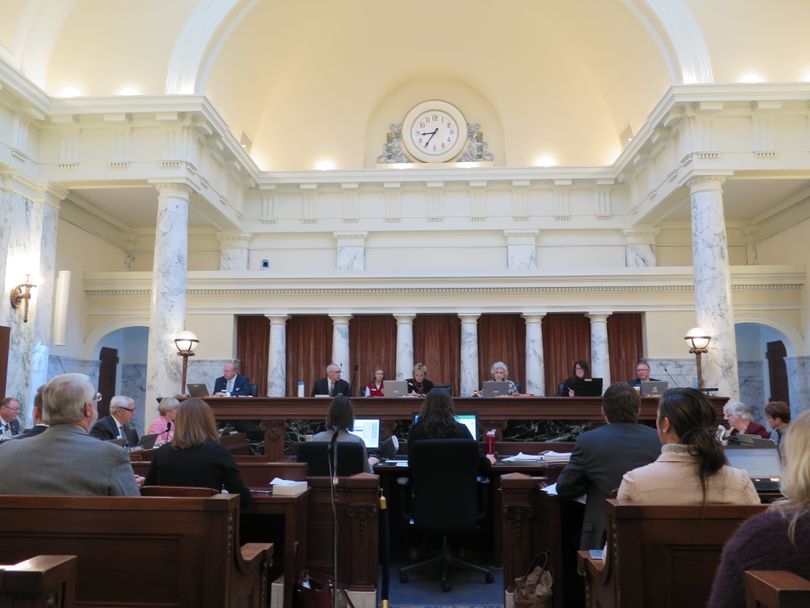Series of unanimous votes sets school budget that shows 5.9% increase

In a series of unanimous votes, the Joint Finance-Appropriations Committee this morning set a public school budget for next year that reflects a 5.9 percent, $100 million increase in state general funds to $1.785 billion; you can read my full story here at spokesman.com. There was no debate or dissent, and support for every division of the complex budget – developed by a bipartisan working group of JFAC members – was unanimous.
“I am so grateful I stayed to see this day,” said JFAC Co-Chair Rep. Maxine Bell, R-Jerome, who is retiring after this year. “Those of you who are new, you can’t believe how this worked before.”
Bell compared the K-12 public school budget to Thanksgiving dinner. “We never saw them chase the turkey and pluck the turkey and dress the turkey, and in an hour, it’s gone,” she said, “and that’s how this happened, but I know they were chasing and plucking for days and days and I am so grateful for those who worked on this motion. I have been here when there were numerous motions. We all care about this budget. And this is so nice – to have it so tasty.”
The budget covers about three-quarters of state schools Superintendent Sherri Ybarra’s request for a substantial increase in discretionary funding for school districts – $7.2 million to help districts cover health insurance cost increases, and $4 million to increase discretionary funding that school districts can direct to their own top-priority expenses, from utilities to textbooks. Otter hadn’t recommended any increase in discretionary funds for school districts next year.
The budget also covers the full $41.6 million cost for the fourth year of the five-year, phased-in teacher “career ladder” plan to boost Idaho teachers’ pay; increases funding for classroom technology by $10.5 million – $500,000 more than either Ybarra or Otter requested; adds another half-million for the cost of IT staffing in school districts, for which lawmakers said districts are facing shortfalls; and increased funding for literacy proficiency by $1.7 million, well below the governor’s requested $6.5 million. Where Otter had requested $5 million for college and career advisors and mentors, and Ybarra had requested $2 million, JFAC budgeted $2 million. Also, it increased professional development funding by $600,000; Otter had requested a $4 million boost.
The group that crafted the budget included Rep. Wendy Horman, R-Idaho Falls; Senate Education Chairman Dean Mortimer, R-Idaho Falls; Sen. Janie Ward-Engelking, D-Boise; and Rep. Steve Miller, R-Fairfield.
“I’ve been here and been part of that contention many times,” Mortimer said. “But I’m grateful for this budget, and I believe it’s doing a very good thing for education. There’s been a lot of discussion and a lot of work.”
Horman said, “There has been an excellent group working these budgets.” She noted that the budget marks the fourth year of Idaho’s five-year plan to improve its schools, laid out by a task force appointed by Gov. Butch Otter. Those task force recommendations, she said, “have given a roadmap to follow. We look forward to seeing how those investments are paying off for our Idaho students.”
Ybarra was brimming with enthusiasm over the newly set school budget. “It’s great – another $100 million for public schools!” she said. “We have a plan to follow, we’re all on the same page.” She added, “I’m really excited.”
On the unanimity among JFAC members, Ybarra said, “I think it says a lot about not creating a budget in a vacuum.” She said the budget “reflects the stakeholders’ voices.”
Other features of the budget: It ends funding for a five-year, statewide wireless technology contract with Education Networks of America next year, as the five years will have ended. All future appropriations for wireless technology will go directly to school districts, who can contract for the services with whomever they wish.
The budget also is missing part of the proposed increase for mastery-based education; that’s because legislation on that hasn’t yet passed. If it does, a trailer appropriation bill would add the funding. The budget also doesn’t cover development of a new version of the Idaho Reading Indicator test for young students; lawmakers said that’s because they’re awaiting the results of a study and will take that up next week in the budget for the superintendent’s office. Funding for the current IRI remains in the school budget.
Sen. Shawn Keough, R-Sandpoint, JFAC co-chair, said the budget covers the career ladder increases plus addressing pay for other staff, from administrators to classified staff, and noted that on some line items, JFAC set the budget between the governor’s recommendation and the superintendent’s request. “Some of them, quite frankly, are carved a little bit to try to put money into discretionary,” she said. “We continue to hear from our superintendents that that flexibility is needed, vs. strings being attached to funding.”
“I think the folks that work on this budget work really hard, and they listened to our school districts and our school boards,” Keough said. “I think that this morning’s work was a reflection of the work they put into that really year-round. It’s nice to have the work of the governor’s task force provide a blueprint.”
Keough, who like Bell is retiring after this year, said, “I’m hopeful the same kind of work and visionary leadership can continue in the next administration and in the next Legislature.”
The school budget bills still need passage in both the House and Senate and the governor’s signature to become law, but budgets rarely change once they’re set by the joint committee.
